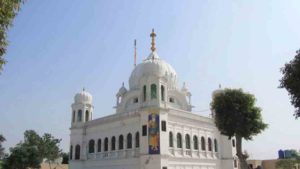The encroached lands were donated to the Kartarpur Sahib by devouts like late Maharaja Ranjeet Singh and others.

New Delhi: Pakistan has “surreptitiously usurped” lands belonging to the Kartarpur Sahib gurdwara in the name of developing a corridor for the convenience of pilgrims and objected to most of the Indian proposals for the project, reflecting its “double-speak”, officials said on Friday.
The Indian delegation, which attended the first India-Pakistan meeting on Thursday to finalise the modalities for the proposed corridor linking Gurdaspur in Punjab with the Sikh shrine in Pakistan’s Kartarpur, strongly protested against the “rampant encroachment” on the lands belonging to the holy Sikh shrine in utter disregard to the sentiments of devotees of Guru Nanak Dev in India.
“Pakistan has lived up to its old reputation of making false promises, making tall claims and delivering nothing. Its double-speak on the Kartarpur Sahib corridor has been exposed in the first meeting itself at Attari on Thursday,” a government official, who attended the meeting, said.
The encroached lands were donated to the Kartarpur Sahib by devouts like late Maharaja Ranjeet Singh and others.
“Lands owned by the gurdwara have been surreptitiously usurped by the government of Pakistan in the name of developing the corridor. A strident demand was made by India for restoration of these lands to the holy gurdwara urgently, keeping in view the strong sentiments on the issue within India,” the official said.
Pakistan wanted to restrict the duration of Kartarpur agreement to just two years, despite India making it clear that it is executing long-lasting and comprehensive facilities at the border by spending Rs 190 crore.
While India has made serious efforts to fulfil the long standing aspiration of the Indian pilgrims and devotees of Guru Nanak Dev for smooth, easy and hassle-free access of pilgrims to Kartarpur Sahib, Pakistan has scuttled the proposals made by New Delhi.
“Against the hype created by the Pakistan government and the Pakistan media, its actual offer during the talks turned out to be farcical and mere tokenism. There is a sea of difference between what Pakistan, including Prime Minister Imran Khan, had announced, and in what they offered at Attari meeting. Clearly, Pakistan is not interested in providing Indian pilgrims easy access to Kartarpur Sahib,” the official said.
While India is executing a state-of-the-art passenger terminal building for visit of over 5,000 pilgrims daily and over 15,000 pilgrims on special occasions like Vaisakhi (falls in mid-April), Pakistan has limited it to mere 700 pilgrims per day.
Pakistan did not agree to the Indian demand of allowing daily visits of pilgrims and has restricted it to “visiting days” which will be specified by it. It did not agree to permit travel of devotees on foot or as individuals, and has insisted on movement of groups of 15 and by vehicle, another official said.
Despite having assured visa-free passage to Kartarpur Sahib, Pakistan has now brought in, through the back door, the requirement of issuance of special permits by them to pilgrims, that also at a fee, which is “outrageous and defeats” the very purpose of the corridor, the official said.
Pakistan has restricted the corridor facility to only Indian Passport holders to the exclusion of large number of Overseas Citizens of India card holder devotees. Pakistan is pretending to be blind to the fact that Guru Nanak Dev holds universal appeal, including the large Indian diaspora, the official said.
Interestingly, when India and Pakistan had signed a pact in 1974 to facilitate the visit of their pilgrims to the shrines located in each other’s territories, Kartarpur Sahib was not included despite repeated Indian requests.
Pakistan has so far resisted all attempts to include Kartarpur in the 1974 MoU, the official said.
As per that agreement, there are 15 shrines in Pakistan and seven in India where each other’s pilgrims can visit.
Kartarpur Sahib marks the place where Sikhism’s founder, Guru Nanak Dev, spent the final years of his life.
It is located in Pakistan’s Narowal district across the river Ravi, about four kilometres from the international border.
Vice President M Venkaiah Naidu and Punjab Chief Minister Amarinder Singh had on November 26, 2018 laid the corridor’s foundation stone in Gurdaspur.
Two days later, Pakistan’s Prime Minister Imran Khan laid the foundation stone at Narowal, 125 km from Lahore.
India hopes that the special border crossing for pilgrims will open before Guru Nanak Dev’s 550th birth anniversary in November 2019.


